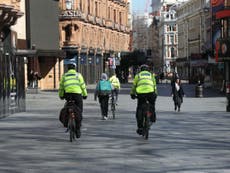Coronavirus: 'Rule of six' laws make it a criminal offence to 'mingle' with different groups in pubs and public spaces
Government criticised for publishing the regulations late on Sunday night, shortly before they came into force
New coronavirus laws have made “mingling” between different groups in pubs, restaurants and other public places a criminal offence.
The updated Health Protection Regulations, which enforce the new “rule of six” restrictions in England, contain complex exemptions to allow businesses to continue operating.
They state that “people may not participate in social gatherings, in any place, in groups of more than six, unless they are members of the same household, two linked households, or exceptions apply”.
The restrictions do not apply to pubs, restaurants, sports centres, places of worship or other places that are operated by businesses, charities or public bodies.
But people may only visit with household members or in groups of six, and the law says they must not “mingle with any person who is participating in the gathering but is not a member of the same qualifying group as them”.
Anyone breaking the law can be punished with a £100 fine, reduced to £50 if paid within two weeks, or arrested in exceptional cases.
Several lawyers questioned the meaning of “mingle”, which was not defined in the law.
The government was criticised for publishing the regulations late on Sunday night, shortly before they came into force, and for again bypassing parliamentary scrutiny despite announcing the change on Tuesday.
Kirsty Brimelow QC, a human rights barrister, said the public had been given “no chance” to fully access and understand the law before it came into force.
“We continue to be governed by decree with the government no longer bothering with parliament,” she told The Independent.
“The government must stop passing laws which undermine the seriousness of laws with a criminal component. They are dropped into publication with less scrutiny than a new series on Netflix.”
The Public Health Regulations stated that: “The Secretary of State [Priti Patel] is of the opinion that, by reason of urgency, it is necessary to make this instrument without a draft having been laid before, and approved by a resolution of, each House of Parliament.”
The government said the new restriction was a response to an increase in coronavirus infections and the virus’ reproduction rate.
On Monday afternoon, the prime minister’s official spokesman said police had not yet been issued with guidance on enforcing the “rule of six”.
“I would expect that today they would be encouraging people to follow the rules, but if in the coming days people do continue to flout them, we would expect the police to issue fines,” he added.
“The rules are in place to stop the spread of the virus and the public will expect them to be enforced, just as other laws are.”
But police officers have said they do not have the capacity to enforce the law, and its numerous exemptions have raised questions about effectiveness.
The rule of six does not apply to gatherings organised by businesses, charities and public bodies in outdoor spaces, protests, marriages, support groups, “significant event gatherings”, or sporting events as long as organisers carry out risk assessments.
Separate laws apply to parts of northern England, Bradford, Blackburn, Bolton, Leicester and other areas that are subject to tighter restrictions because of a rise in Covid-19 cases.
Official guidance on how police officers will enforce the new “rule of six” laws had not been published on Monday morning.
The Police Federation, which represents rank-and-file officers in England and Wales, said there had been “confusion for the public and many people don’t know exactly what the law says”.
Chair John Apter called for the government to start an “effective” information campaign, adding: “For policing, these constant changes to legislation are becoming the norm. The pressures on policing have increased significantly over recent months, and this latest change will add to this pressure.”
Brian Booth, chair of the West Yorkshire Police Federation, told The Independent that officers “simply can’t enforce” the new restrictions as crime returns to pre-lockdown levels.
“We just don’t have the resources, the world has woken up again and it’s busy,” he added.
“We’re back to dealing with threat, risk and harm - domestics, assaults, missing people, mental health incidents, road accidents and everything that comes under normal policing.
“Resources are outstripped with that demand, never mind adding on Mrs Miggins reporting that seven people are having a barbecue next door.”
Mr Booth was speaking before the policing minister, Kit Malthouse, appeared to encourage concerned neighbours to alert police.
He told BBC Radio 4's Today programme: “”It is open to neighbours to do exactly that through the non-emergency number, and if they are concerned and they do see that kind of thing, then absolutely they should think about it.“
Martin Hewitt, chair of the National Police Chiefs’ Council, accepted that rule changes are ”confusing for the public“.
”We work with all our partners in local authorities, people who are running shops, people who are running other hospitality areas, we are part of the group that are trying to explain to members of the public what the rules are and encouraging people to comply with them,” he told BBC Breakfast.
Deputy Assistant Commissioner Matt Twist, who leads the Metropolitan Police's response to coronavirus, said officers will be patrolling public spaces and will respond swiftly to incidents where groups gather in large numbers.
“Where people just won't listen, and are putting everyone at risk, we absolutely will take enforcement action,” he said.
The new measures follow a spike in coronavirus cases across the UK, with more than 3,000 cases recorded for the third day in a row on Sunday – the first time since May that cases were above 3,000 on three consecutive days.





